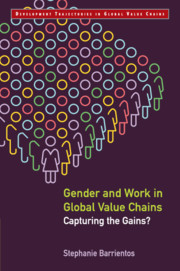Book contents
- Frontmatter
- Dedication
- Contents
- List of Tables
- List of Figures
- List of Abbreviations
- Preface
- 1 Introduction
- 2 Retail Shift and Global Sourcing
- 3 Gender Patterns of Work in Global Retail Value Chains
- 4 Global (re)Production Networks Analysis
- 5 Smallholder (dis)Articulations: The Cocoa–Chocolate Value Chain
- 6 Mixed Outcomes: Downgrading and Upgrading in African Horticulture
- 7 Contested Terrain: The Limits of Social Compliance in Asian Apparel
- 8 Upgrading Strategies: Innovation, Skills and Rights
- 9 Governance Challenges: Promoting Gender-Equitable Value Chains
- 10 Concluding Reflections: Future of Work
- References
- Index
7 - Contested Terrain: The Limits of Social Compliance in Asian Apparel
Published online by Cambridge University Press: 26 April 2019
- Frontmatter
- Dedication
- Contents
- List of Tables
- List of Figures
- List of Abbreviations
- Preface
- 1 Introduction
- 2 Retail Shift and Global Sourcing
- 3 Gender Patterns of Work in Global Retail Value Chains
- 4 Global (re)Production Networks Analysis
- 5 Smallholder (dis)Articulations: The Cocoa–Chocolate Value Chain
- 6 Mixed Outcomes: Downgrading and Upgrading in African Horticulture
- 7 Contested Terrain: The Limits of Social Compliance in Asian Apparel
- 8 Upgrading Strategies: Innovation, Skills and Rights
- 9 Governance Challenges: Promoting Gender-Equitable Value Chains
- 10 Concluding Reflections: Future of Work
- References
- Index
Summary
Introduction
Women have long played a key role in apparel production, both as contributors of family labour in traditional home-based work and as waged workers in larger-scale manufacture. Apparel is a relatively ‘footloose’ labour-intensive industry, and production can easily be relocated across countries in pursuit of lower costs. The outsourcing of apparel production from Europe and North America to developing countries in the 1980s led to the rapid rise of female employment, particularly in Asia. This generated jobs for tens of millions of women workers, many of whom previously had limited labour market access. Indeed, women are a preferred ‘low cost’ labour force in many countries because of their perceived ‘docility’ and their socially acquired skills in making garments (Elson and Pearson 1981; Hale and Wills 2005).
Developing countries often compete based on low labour costs to attract apparel FDI and buyers, driving a ‘race to the bottom’ (Applebaum et al. 2005; ILO 2016d). Civil society campaigns have long targeted global retailers and brands for driving a ‘low road’ sourcing model based on a cheap female labour force with poor working conditions and few rights (Oxfam 2004; ITUC 2016).
However, as Chapter 2 discussed, the expansion of global value chains since the 1980s has also led some buyers to move away from traditional arms-length sourcing based on low-cost assembly of ‘cut–make–trim’ (CMT) to more integrated ‘full package’ sourcing strategies. These have been labelled original equipment manufacturing (OEM) and original design manufacturing (ODM). This move requires economic upgrading and innovation by suppliers in order to be able to take on higher-value functions, including design, input sourcing, finishing and distribution (Gereffi and Memedovic 2003; WTO 2013b). Economic upgrading often requires workforce innovation and more skilled workers, to enable the achievement of higher quality and productivity levels, with implications for social upgrading and improved labour standards (Barrientos et al. 2011; Fernandez-Stark et al. 2011b).
Two types of supplier strategy can therefore be identified: the ‘low road’ of economic and social downgrading, based on low labour costs, and the ‘high road’ of economic and social upgrading, based on skill and productivity. In this chapter I focus on the ‘low road’; Chapter 8 examines a contrasting upgrading case study from an Indonesian apparel manufacturer.
- Type
- Chapter
- Information
- Gender and Work in Global Value ChainsCapturing the Gains?, pp. 167 - 193Publisher: Cambridge University PressPrint publication year: 2019



